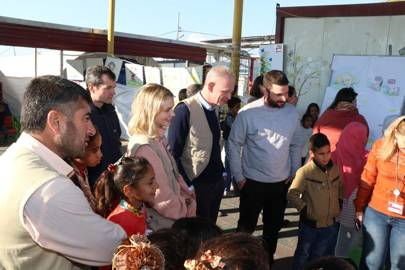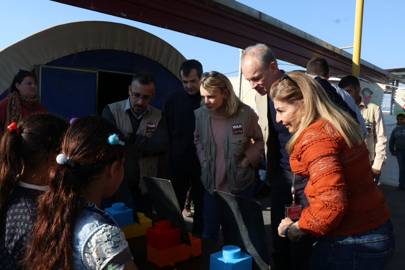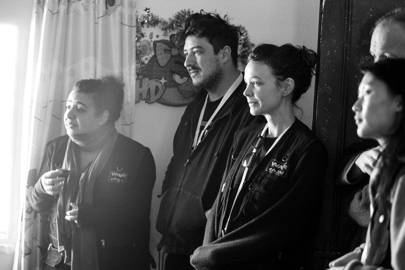Carey Mulligan is much more than just an Oscar-nominated actress, which is impressive in its own right. What is even more impressive about Carey is that alongside her dazzling film and theatre career, being the mother to her two children with her husband, Marcus (the Mumford and Son’s star), she is a vocal activist for War Child. Oh, and she is really fricking nice – may I just add!
As charities face one of the biggest funding problems in living memory, Carey, as a long-term ambassador for War Child, is putting her all behind the War Child Emergency Coronavirus Crowdfunder. With such items as a Mission Impossible stunt session with GLAMOUR babes, Vanessa Kirby and Hayley Atwell up for auction, the goal is to reach £400,000 to help children who are not only dealing with being displaced by war, they are now contending with a global pandemic. Plus, as modelled by Carey herself, you can buy a limited-edition Cressida Jamieson embroidered sweatshirt – which we are buying asap.
Here, as I zoom into Carey’s house, deep in the English countryside and find her taking solace in her husband’s recording studio, far away from the kids, she opens up about why her work for the charity took on new meaning when she became a mother, the stories of displaced children she will never forget and why listening is the most important thing we can do right now…

How have you been navigating lockdown as a family?
We’ve just been really lucky. You sort of feel bad for saying that and I think a lot of people kind of feel a bit guilty having had a lovely time. As a family it’s been really nice for us and we had lots of extended family with us for a lot of lockdown. We have found it definitely challenging at times, especially when we were in proper lockdown and we just couldn’t go anywhere – everyone’s found that tricky in different ways. But imagining what that must be like for people living in some of the countries that we’re working with really makes you reflect. Like last year in Iraq, we visited refugee camps where there are Yazidi refugees were still living there years after they’ve left their homes. Imagining those kids locked down, not being allowed to congregate, not being allowed to see their friends, trying to do homeschooling with a kid in a tent with multiple other children of all different ages, trying to keep them all on track – it just must be so horrendously stressful, worrying and with all the economic concerns that families will be having. So, whilst we’ve been having a really nice time, we’ve been thinking a lot about that and I think everyone has. If you’ve been lucky enough to have a decent experience of this whole thing, I think people have spent time thinking about how tricky it has been for lots of other people.
What is a story that you heard whilst working with War Child that has really stuck with you and shaped you?
Some of the experiences that the children have had have been so horrendous. The first trip I went on in 2014 was to Goma, to the Democratic Republic of Congo. We went out one day and visited this rural community couple of hours outside of Goma. I met a girl there and she was part of the Child Friendly Space. War Child provide these amazing Child Friendly Spaces where they provide education but they also psychosocial support and somewhere to play. There are teachers, counsellors and people who are there to just keep an eye on all of their welfare.
One of the girls I met there that had a terrible story. She said, ‘I’m really afraid to go to bed at night.’ It seemed quite like a normal thing, a bit like ‘I’m afraid of the dark,’ in the way that lots of kids say they’re afraid of the dark. I gently probed and she told me the story about what had happened to her family – she’d lost a family member in a really brutal and violent way. She would dream at night that men would come into her house in the middle of the night shouting, hurt her, take her away and rape her. She was 11 years old, and that was her fear.

It just struck me that no child should ever have to feel that kind of fear, but there she was happily talking to me, playing, and we hung out. We couldn’t speak a word of each other’s language, but she started singing and we just sat together. There was a part of her that was just so innocent, but at the same time she had this incredibly heavy burden of fear and trauma because of what she’d been through. That was really a big moment in starting to work with War Child, just thinking that, no child should have to experience this. No child should have their childhood taken away from them, which is effectively what had happened to her, you lose your innocence in that way.
I remember another time in Jordan, meeting Syrian refugees. I went around this class and all these girls who were 11-12 years old, were saying, ‘I want to be a doctor. I want to be a lawyer. I want to be an engineer.’ I was so impressed because I think I wanted to be a hairdresser or a fireman when I was that age. And then the last person to speak said, ‘I want to be an architect so that if my house is destroyed, I’ll know how to rebuild it myself.’ The strength that they have and the resilience that these children have is remarkable, but they shouldn’t need to think that way – it’s insanity. That’s what my passionate belief is and is the narrative to all of War Child’s work, that these children are incredibly brave, strong and resilient but they shouldn’t have to be because they should be allowed to be children.
Does hearing about this level of trauma that these children experience take on a deeper, more almost personal meaning, knowing that you have children of your own?
Oh, definitely. It impacts you a lot but definitely since having kids. It’s just impossible to imagine my kids having to go through anything like what these kids have experienced. They’re incredible, so many of them have a joy and desire to learn. That’s what really strikes me when I’m on trips with War Child is that you never see a kid who doesn’t want to be in school. The desire to be the best in their class, to know the answer to the question -everyone wants to be learning. There’s a real hunger for education and there’s nobody who’s taking it lightly.

What do you think working with War Child has taught you about the power of your own voice and using your own voice?
There’s always a bit of nerves before you start advocating for an organisation because I think there’s a lot of cynicism around people who are in the public eye doing stuff. But I do feel that there’s a responsibility and if people listen, have their mindset slightly changed or maybe encourage them to give some money, there was just no reason not to. It feels like you have to do it.
It’s a true privilege to work with War Child and I feel so honored to get to be a part of it and that pushes aside any fear of someone calling me, ‘a woke liberal,’ or, ‘terrible celebrity,’ or whatever. You’re just like, ‘I don’t care because somebody might give a fiver, and that fiver might buy somebody a hygiene kit so that a family can protect themselves from coronavirus.’
It’s a real shame that we’re even still living in a world where you need to worry about whether people might see something as being ‘too woke’ or ‘liberal’ when you are just trying to help…
Yeah. I’m sure people come from all sorts of positions, but I do think we’re getting into a more empathetic place as a society. The support for the Crowdfunder has been amazing from the public and from the artists who’ve helped us, so I feel like this has really made people much more aware of everyone else’s situation.
Why do you think the Crowdfunder is so needed right now?
Well, the most important thing is that the services that War Child is providing can carry on. Ordinarily War Child relies a lot on gigs and fundraisers which aren’t happening right now. If suddenly there needs to be a team of people in the Central African Republic on the ground in a certain place and there are vulnerable children who need to be protected, that money can immediately be assigned to that project is we raise this money with the Crowdfunder. There’s lots of grant funding that needs to tick lots of boxes and go to certain things, but we need unrestricted funding, straight on the ground to go to wherever it is needed.
Children are now getting education home kits from War Child, they’re getting hygiene kits, they’re doing WhatsApp counseling -as they’re all on phones – and none of that can collapse. There are so many things that they’re doing to keep kids safe during this and making sure that children who might be vulnerable to exploitation, to becoming child soldiers, girls being sent at a really young age to go and work as sex workers, are all protected. That all requires lots of case management of very difficult children in very difficult circumstances.
What do you think is the most pressing issue facing children today?
The sad thing is that ordinarily I would probably say education. I would probably usually say that they need to get back into structured educational setting where they can be around their contemporaries. But sadly, now we are in a situation where some of these children’s parents are day laborers and we need to make sure they are earning enough money to pay for bread the next day. If they can’t go out and work, whether they’re under lockdown or whether for health reasons it’s too risky for them, they will have run out of money already.
War Child is now, in some situations, even providing cash handouts just to get people through the day, just so they can buy enough food to live. There are kids who have now gone from being terribly poor to just nothing overnight just because parents can’t go out to work because they are too physically vulnerable to. I think most importantly now, it is just getting kids enough food to be able to survive this and then beyond that it’s hygiene. We’re talking about families that can’t afford a bar of soap to wash their hands to keep them safe and then the next step I guess would be education.
I don’t know if I feel qualified to say I’m an activist. I think true activists dedicate their entire lives to the work that they do. But I think everyone can embody that in some way, whether it’s stuff that I do with Marcus hosting fundraisers or my incredible friend, Ross Stirling who climbed the equivalent of an enormous mountain just in the stairwell in his apartment building to raise money for War Child.
People are increasingly feeling empowered to just say what they think, and really stand up for what they believe in. I think there’s capacity for everyone to be an activist in some way. The most important thing I think though beyond anything is just listening, and that’s what I really learned from Rob Williams (the head of War Child). When I went on my first trip with him to Goma we walked into this terrible place. It was a refugee camp of entirely displaced people. They’d fled from another place locally where there’d been terrible fighting and lots of women and children where there. I’ve never seen anything like the poverty there, it was so extreme. The tents were barely standing, and two children had died the week before of malnutrition.
We walked in and everyone was just trying not to burst into tears. What really struck me about how Rob behaved was he just walked in there, held himself together, got down on his knees, started asking the children what they needed and listening to their answers. The children were just talking and talking, saying, ‘We really miss school. I really miss my house and my things.’ He just listened and, on every trip, I’ve ever been on that’s what it is – it’s a listening trip. We listen and by listening you give people dignity. To listen to stories is to give somebody dignity and give them their voice if they feel it’s been taken away from them – that just shouldn’t happen to anyone. I think you can be an activist by just learning and by listening. I don’t do anywhere near enough of it, but I do think it’s a really important part that I try and remind myself to do.
